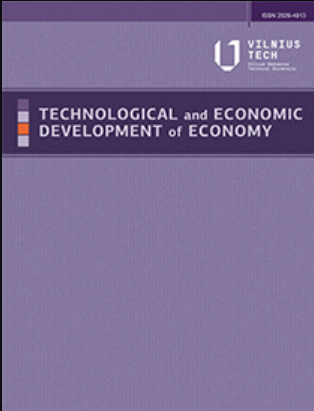欧洲国家生态效率、生态创新与可持续发展目标的联合分析:dea方法
IF 3.9
2区 经济学
Q1 ECONOMICS
引用次数: 2
摘要
在个别国家和国际上,不同的社会经济问题日益复杂和相互交织,这意味着单一主题的分析没有考虑到所有的关系,因此具有认知局限性。因此,结合几个研究领域的研究在文献中越来越普遍,以澄清联系和关系。在本研究中,考虑到阶段的顺序性,生态效率、生态创新和可持续发展目标(SDGs)进行了综合分析。该分析是在2017-2019年对27个欧盟国家进行的。采用动态网络SBM和动态分区Malmquist指数进行研究。研究结果表明,欧盟国家在生态创新和可持续发展目标方面取得了相对较高的效率成果。所有欧盟国家的平均整体效率水平仅为0.63。生产力的变化同时受到前沿转移和追赶效应的影响,但仅在生态效率和生态创新方面受到影响。同时,前沿转移效应不影响可持续发展目标生产率的变化。本文章由计算机程序翻译,如有差异,请以英文原文为准。
JOINT ANALYSIS OF NATIONAL ECO-EFFICIENCY, ECO-INNOVATION AND SDGS IN EUROPE: DEA APPROACH
The growing complexity and intertwining of different socio-economic issues both in individual countries and internationally mean that single-theme analyses do not consider all the relationships and thus have cognitive limitations. Therefore, studies that combine several research areas are increasingly common in the literature to clarify the connections and relationships. In this study, considering the sequential nature of the stages, a combined analysis of eco-efficiency, eco-innovation, and Sustainable Development Goals (SDGs) was performed. The analysis was carried out for 27 European Union countries in 2017–2019. Dynamic Network SBM and Dynamic Divisional Malmquist Index were used for the study. The research results show that the EU countries achieve relatively higher efficiency results in eco-innovation and SDG than ecoefficiency. The average overall efficiency level for all EU countries was only 0.63. The change in productivity was influenced by both the frontier shift and catch-up effect, but only with regard to eco-efficiency and eco-innovation. At the same time, the frontier-shift effect did not affect the change in SDG productivity.
求助全文
通过发布文献求助,成功后即可免费获取论文全文。
去求助
来源期刊
CiteScore
10.00
自引率
8.50%
发文量
66
审稿时长
15 weeks
期刊介绍:
Technological and Economic Development of Economy is a refereed journal that publishes original research and review articles and book reviews. The Journal is designed for publishing articles in the following fields of research:
systems for sustainable development,
policy on sustainable development,
legislation on sustainable development,
strategies, approaches and methods for sustainable development,
visions and scenarios for the future,
education for sustainable development,
institutional change and sustainable development,
health care and sustainable development,
alternative economic paradigms for sustainable development,
partnership in the field of sustainable development,
industry and sustainable development,
sustainable development challenges to business and management,
technological changes and sustainable development,
social aspects of sustainability,
economic dimensions of sustainability,
political dimensions of sustainability,
innovations,
life cycle design and assessment,
ethics and sustainability,
sustainable design and material selection,
assessment of environmental impact,
ecology and sustainability,
application case studies,
best practices,
decision making theory,
models of operations research,
theory and practice of operations research,
statistics,
optimization,
simulation.
All papers to be published in Technological and Economic Development of Economy are peer reviewed by two appointed experts. The Journal is published quarterly, in March, June, September and December.

 求助内容:
求助内容: 应助结果提醒方式:
应助结果提醒方式:


